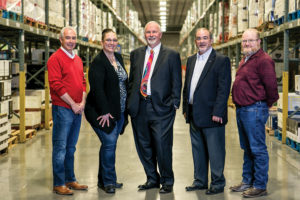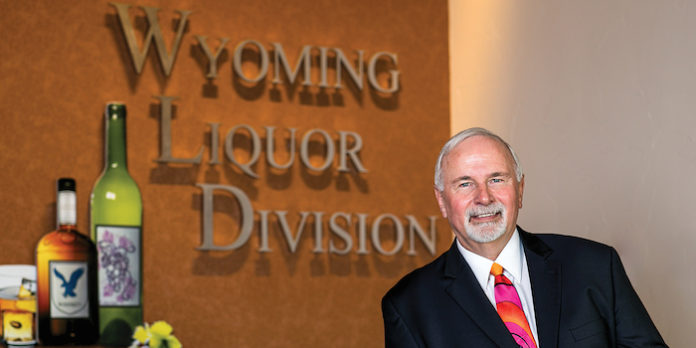Control states often juggle many conflicting priorities. In addition to being large revenue generators for their respective states, control states are generally charged with overseeing enforcement and education as well. As Director of the Wyoming Department of Revenue and overseer of the state’s Liquor Division, Dan Noble is well versed in these challenges. He plans on utilizing his experience to help members of the National Alcoholic Beverage Control Association (NABCA) better address these issues when he assumes the role of chair.

Leading Wyoming’s Department of Revenue
Noble has spent almost 21 years serving the government of Wyoming. He was recently re-appointed to the director role in January 2019 by Governor Mark Gordon, a position he has held since 2013 when he was appointed by Former Governor Matthew Mead. Prior to assuming his current role, Noble served as the Department of Revenue’s Administrator of the Excise Tax Division and also as Administrator of the Administrative Services Division. Before working in state government, he worked in public accounting as a microcomputer consultant and spent several years as the Chief Financial Officer of an ambulance company. Noble also served as a surgical technician in the U.S. Army for seven years. Aside from that time spent in the army, Noble has lived in Wyoming his entire life and is dedicated to working to constantly improve his state.
As Director of the Department of Revenue, Noble oversees a number of areas, including the Administrative Services Division, the Excise Tax Division, the Mineral Tax Division, and the Property Tax Division. He finds his work with the Liquor Division very unique in that he thinks it functions much more like a business than other areas of government.
“Our focus in this area is making sure we provide the highest level of service to our customers,” Noble says.
In Wyoming, the Liquor Division acts as the sole wholesaler of alcoholic spirits and wine, selling to an independent retail sector. The state focuses on the sale of wine and spirits to its licensees (malt beverages are distributed by independent wholesalers). Licensure in Wyoming is managed at a local level, although the Liquor Division provides general recommendations in this area. The division also oversees alcohol-related education and enforcement.
With 41 employees, the Liquor Division is the largest area of the Department of Revenue and operates out of a 145,000-square-foot warehouse in southeast Wyoming. For more than a decade, Wyoming has experienced steady growth in terms of overall volume. Select product categories have also grown rapidly, particularly premium spirits, along with increased sales of tequila and new ready-to-drink products. During the current fiscal year, the division’s overall case sales are increasing by 3.18%, and total dollar sales are up by 5.8%. More than 2,300 products are maintained in warehouse inventory at all times. The division will split any cases in order to give a benefit to smaller retailers, of which there are many. (The incredibly rural state of Wyoming has a total of 1,300 retailers.) The warehouse has utilized a pick-to-voice system since 2012, which allows the division to operate at a maximum level of efficiency with people picking and fulfilling orders – the current warehouse record is picking 18,000 bottles in a single day.
Customer service is also noteworthy in Wyoming: any order placed by noon Monday through Friday will be delivered within 24 hours, anywhere across the state. The division contracts with an external shipping company to enhance delivery capabilities and maximize departmental resources. Special orders are also very popular in Wyoming, and show no sign of slowing down: in the past eight years, special orders across the state have increased by 78%.
The division maintains close ties with its many suppliers and has more than 44,000 total SKUs in its database. Nearly 75% of all orders across the state are placed online: the division has utilized its eLiquor online platform since 2007. Along with being the easiest method for retailers to place orders, eLiquor also has a feature that gives the division an opportunity to feature new products. eLiquor also serves as a supplier and broker portal featuring various sales tracking capabilities, and contains a number of alcohol education resources.
This strong focus on service, product selection and fulfillment has resulted in ongoing success for the division despite some of the fiscal challenges the State of Wyoming has faced in recent years.
“Wyoming is very dependent on mineral wealth across the state, which can generate many savings in terms of tax revenue,” Noble explains. “Even though mineral production in Wyoming was drastically down from 2014 to 2016, we didn’t experience any drop-off in revenue from liquor.”
Compliance is another large component of the Liquor Division’s work. Periodic site visits are conducted twice per year at all retail locations across the state. The division also organizes multiple educational opportunities. One popular offering, the TIPS training program, is a partnership with the Wyoming State Liquor Association that focuses on server training. The program has become so popular that many jurisdictions across the state plan on making it a mandatory training program for all servers.
An additional program took the form of an educational video that was funded by a NABCA grant. The video focused on Wyoming liquor law and how the law relates to alcohol servers across the state. Another NABCA grant allowed Wyoming to create special event kits including items such as ID scanners, wristbands and signage, which are loaned to organizers of large-scale public events across the state at no cost. The ten-day Cheyenne Frontier Days Rodeo, the Wyoming State Fair and the weekly Cheyenne Spring Concert Series are just some of the events that utilize these event kits in an effort to host the most compliant and safe events possible.
A current NABCA grant will be used to produce a video about the history of the liquor industry. The video explains how Wyoming became a control state and how the current control model is administered.

Planning for NABCA’s Future
Noble will succeed outgoing NABCA Chairman Jeffrey Painter, who also serves as Chairman of the Virginia Department of Alcoholic Beverage Control (Virginia ABC). Painter’s work over the past year largely focused on his theme of “Advancing Future Value.” He amassed quite a list of accomplishments during his tenure as chair, including leading a number of productive meetings and collaborations with various partner organizations. As chair, Painter helped develop a polling project in order to gain insight into how people think about the control state model. He also spearheaded the launch of a cannabis information effort, which compiled data collected from all states that have legalized recreational cannabis. Additionally, Painter helped deepen NABCA’s relationships with various tax, trade and prevention partners across the country and around the world.
One of Painter’s most memorable experiences as NABCA chair was having an opportunity to visit all 18 control states.
“In this role, I got to visit all the different agencies, talk with staff, brainstorm about new opportunities and develop a much better understanding of the wide variety of goals and challenges they have,” Painter recalls. “This has actually grown into a new NABCA program that will facilitate interstate travel opportunities among our members, and not just to other control states, but also to different places that will help them add value and deeper understanding to the work that they do.”
James M. Sgueo, President and CEO of NABCA, is extremely grateful for Painter’s leadership over the past year.
“So often, NABCA’s members and even the association are more reactive than proactive,” Sgueo says. “With Jeff’s goal this year to advance our future value, he encouraged everyone not only to look ahead but also to embrace the efficiencies technology can provide. Many of the control systems are already modernizing, but there have not been enough opportunities to share some of these innovative practices with other jurisdictions. Because of Chairman Painter’s efforts, more opportunities have been created.”
Noble will transition into the role as NABCA chair beginning at the organization’s annual conference in May 2019, which will be held in Marco Island, Florida. In addition to balancing his work with the Wyoming Department of Revenue, Noble has served as a NABCA board member for the past six years and looks forward to tackling the various legislative, operational and political issues facing the organization. His theme for the upcoming year, “Balancing Competing Priorities,” will allow him to apply his experience to the control state model in a much broader context.

“We realize that we aren’t dealing with your everyday retail product. It can have some very negative implications if handled improperly,” Noble says. “We’re all working to generate revenue for the states, but we also need to make sure we do so responsibly and never overserve. In advancing the goals of NABCA through the control states, we need to understand how to go about balancing those conflicting priorities.”
Along with balancing priorities, Noble is committed to ensuring that there is fairness among retailers, and that all distillers are treated the same way. He also realizes that control states often find themselves under scrutiny by the legislature. Noble thinks it’s important to identify new ways in which to remain relevant, along with continuing the work Painter undertook last year by promoting how control states can continue adding value in the future.
Sgueo thinks Noble is well positioned to lead NABCA forward in the upcoming year.
“By balancing conflicting responsibilities, Dan recognizes and understands first that all the control systems have multiple responsibilities and they all carry an importance that can’t be overlooked or relegated to a minor importance,” Sgueo says. “Second, all control systems are different and have responsibilities that others may not have. Some control agencies have more enforcement responsibility than others, some have more retail involvement than others. Chairman Noble is able to appreciate the support NABCA provides to its members is not necessarily monolithic, but multi-faceted as each jurisdiction relies on their association a little differently.”
Painter agrees. “Dan is going to be a great chairperson,” he says. “He was in the army, he was a CFO and he’s given many years of dedicated service to the state of Wyoming. All of these diverse experiences prepared him for the challenges that come with this new role, and he’s got everything he needs in order to be very successful.”










